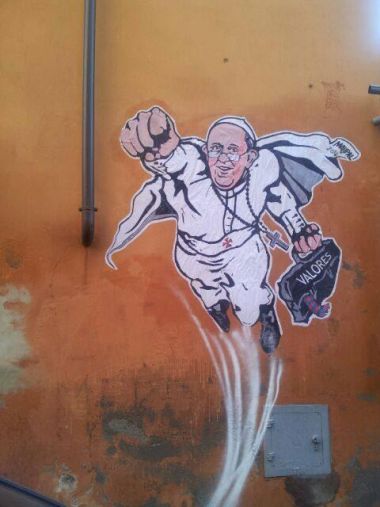Where have all the Pope's pennies gone? Vatican profits drop by £66million

We know Pope Francis isn't one for flashy cars or expensive red leather shoes, so where exactly has the €83.7m (£66.7m) gone from the Vatican's bank account?
The financial statement from the Institute for Religious Works (IOR), the official name for the Vatican bank, showed a fall in net profit from €86.6m in 2012 to €2.9m in 2013.
"Extraordinary expenses", the write-down of investments and the fluctuation in the price of gold were named as some of the reasons for the sudden decline. So will the 'austerity Pope' have to pinch even more pennies in the future?
Well, no. It isn't all doom and gloom. Net profit in the first half of 2014 is looking healthier, making it likely to match the 2012 figures.
But a drop in profits is not the only issue facing the Vatican Bank, a notoriously secretive insitution facing irregularity. Pope Francis is continuing the work begun by his predecessor - seeking to bring the bank in line with international financial regulations. Last month, he fired five of the bank's finance directors.
This week, a swathe of new appointments, including the former head of Invesco's European business, Jean-Baptiste de Franssu, as president, marks the start of the second wave of reforms that Pope Benedict approved before his departure.
The first phase, which started in May 2013, targeted compliance, focusing on church customers, and transparency.
One of the main criticisms of the bank is that it is only supposed to manage the finances of Roman Catholic orders of priests and nuns, charitable institutions, and Vatican employees, but it was found to have illegitimate customers on its books and legitimate account holders have handled money for third parties.
As a result, the bank has blocked the more than 2,000 accounts since May last year, including both individual and institutional members, having screened the accounts for missing data. It also reported terminating around 3,000 customer relationships.
But there's a lot of work to be done if the Vatican is going to change the reputation of a financial institution primarily known for secrecy and scandal.
Although the bank was founded in 1942, its first annual report wasn't released until October 2013.
In 2012, the bank's former president, Ettore Gotti Tedeschi, left following a vote of no confidence from the board. During his term both he and the Vatican were investigated on suspicion of money laundering.
A former senior Vatican accountant, Monsignor Nunzio Scarano, is currently on trial for smuggling money into Italy as part of a tax avoidance scheme for his friends.
Scarano's arrest in 2013 also resulted in the resignation of the IOR's director and deputy director, over allegations of corruption.
It is questionable whether the IOR will ever be able to shake off the shadow of its past. Pope Francis had suggested that the bank might have to close, but in April this year he confirmed that it would stay in operation and the reform process would continue.
Cracking down on corruption is a priority for the Pope, who last month "excommunicated" the Mafia, accusing them of the "adoration of evil". So if anyone is going to get the Vatican's finances in order, he will.











